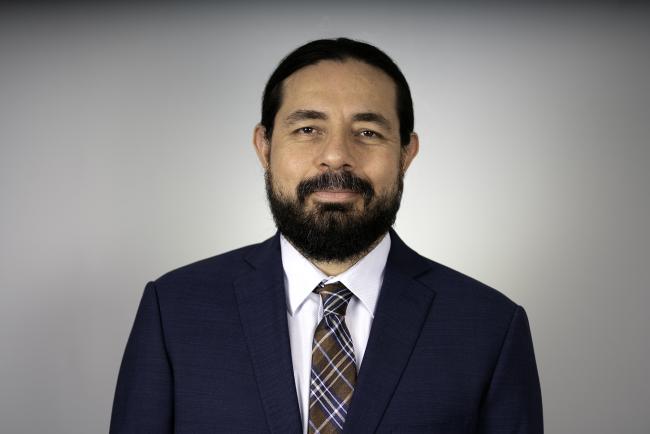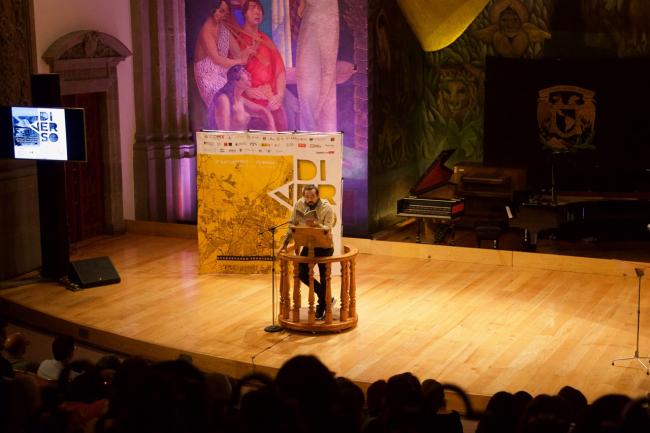Jorge Omar Ramirez-Pimienta
Jorge
Jorge Omar Ramirez-Pimienta
Assistant Professor
Jorge Ramirez-Pimienta, PhD, was awarded a 2022-24 University of California President's Postdoctoral Fellowship. He is sponsored by Professor Amy Carroll (UCSD) and Ben Olguin (UCSB), and will take his fellowship in residence consecutively at both campuses.
I was born to a deportee “Bracero” father who worked the fields and industries of California in the 1960’s, and a mother who obtained her green card by becoming an indispensable housekeeper to a wealthy San Diego family. grew up in Tijuana’s oldest neighborhood witnessing the gradual militarization and fortification of the walls that limit Colonia Libertad. As a child I listened to my mother recite her nostalgic poetry to relatives from her hometown in Jalisco on their last stop before their attempt to cross the border; and I grew up crossing this border to install window racks and gates made at father’s iron workshop. We all had green cards but we could not afford to live in San Diego; yet, as it was for many border dwellers, the city was part of our world even if it never really claimed us. After my mother’s death, I dropped out of High School in Mexico and used my uncle’s US address to get a full-time welding job at Miller Marine shipyards, and enrolled in adult-night-school, eventually attending San Diego City College, where I now teach as an adjunct faculty. My BA is in Latin American Studies, yet I gravitated towards Literatures in Spanish after Professor Mario Martín-Flores incorporated me into his Literary workshop and digital archive project—Baja California Literature in Translation—which ignited my creative writing and research interest in my region’s authors.
My family of laborers, proletarians, and poets produced three humanist sons. One of my brothers, a scholar of narcocorridos, set a transborder academic journey for me to follow by earning a Ph.D. from the University of Michigan. My other brother went from a transborder construction worker for seventeen years to a full-time artist. He currently has a solo show at the Massachusetts Museum of Contemporary Art. I chose to take the dual track of being both a visual artist and scholar. I received an MFA in Visual Arts from UCSD in 2009. I returned to UCSD in 2012 to pursue a Ph.D. in Literature, with an emphasis in Spanish. As a trans-border and trans-disciplinary practitioner, I am inspired by my mother’s and father’s active popular art that was both physical and metaphysical, concrete and ephemeral. My body of work really is conceived of as a single Social Sculpture exercise where my research, creative writing, performance, and public installations are invested in exploring how distinct personal and collective memories utilize the verbal, written, and visual language to create a fugitive identity, interstitial subjectivity, and anti-citizenship, particularly in the uniquely amorphous interstitial spaces between nations and paradigms. My MFA thesis project Welcome to Colonia Libertad, a community-based installation, conceptualized my Colonia as the geographical anchor for migrants as “post-citizens.” Two equally important and transformative experiences emerged through my collaboration on Professor Martín-Cabrera’s digital humanities audiovisual archive, “Spanish Civil War Memory Project,” as well as the “Transandean Lithium Project” in which I interviewed Quichua, Kolla, and Atacama indigenous people of the border region shared by Argentina, Bolivia, and Chile regarding their potential displacement and cultural destruction due to lithium exploitation. These projects introduced comparative global borderlands studies that spoke to my own reality, which I explored in my dissertation and will develop into a book.
For me, art and criticism must be grounded in the lived realities of people in struggle if it is to justify itself. Driven by my childhood familial experiences and creation of a people’s art, I remained grounded in workers’ struggles throughout my education. In 2016 I became Binational Research Director of UCSD’s Community and Labor Project. I interviewed many deportees and saw my father’s history in theirs. I developed a Resource Guide for Deportees that helped them access assistance, shelter, and governmental support. That engagement ignited the writing of my most recent poetry book about my family’s interstitial mobility and identity. My multimedia, multigenre art, and labor activism all coalesce in my transborder agency, one that I know is shared with a cadre of writers, artists, scholars, and laypersons. Accordingly, my current book project seeks to produce the theoretical tools to examine their cultural production and the complex transfronterizo context in which it is created.

